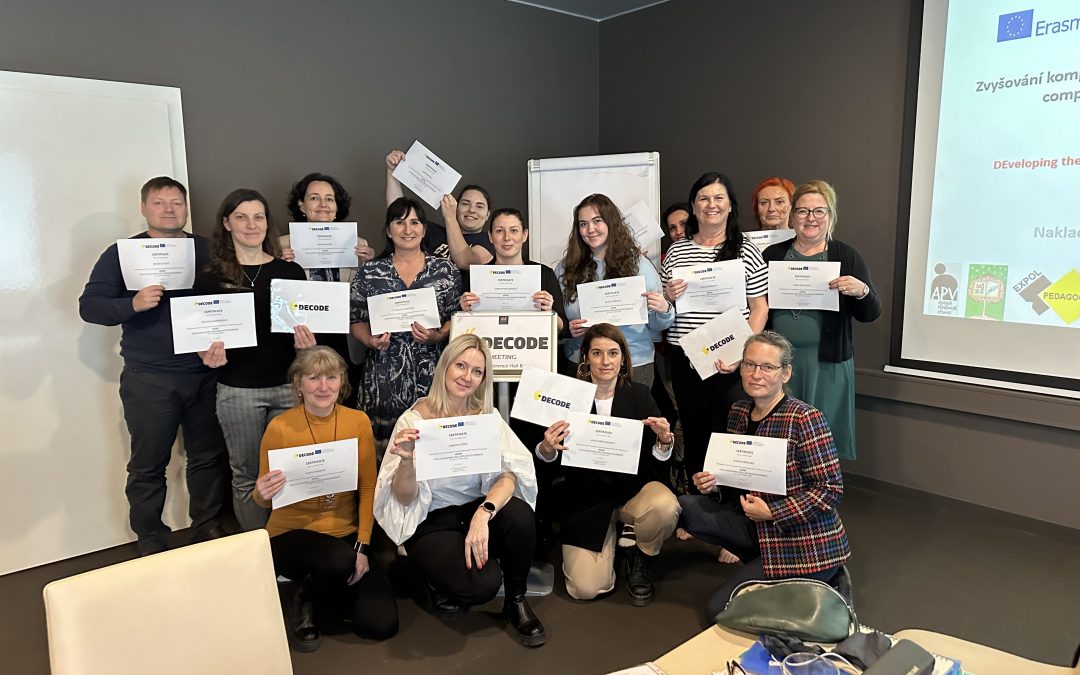During the year and a half of its duration, the international project “DECODE” went into full swing, with several larger meetings and many “micro-meetings” where we jointly looked for solutions, research outputs, set up processes, and, most importantly, shared experiences within the organisation, as well as between organisations from all project countries.
In today’s newsletter, we provide two final outputs of our project that you can download
in the form of FREE E-BOOKS:
- a handbook for early childhood education teachers
DOWNLOAD HERE
https://drive.google.com/drive/folders/1Lz09bEzBTOSrDewB6iEzrVWWLXmz_jXw
- a guide for parents
DOWNLOAD HERE
https://drive.google.com/drive/folders/1e2iAxfeZ0QaUlCgcg9CYbIO7TBzF-E8l
A HANDBOOK FOR EARLY CHILDHOOD EDUCATION TEACHERS: Promoting Cognitive Development in Early Childhood Education
Introduction
One of the first project outcomes is a publication titled Promoting Cognitive Development in Early Childhood Education: A Handbook for Early Childhood Education Teachers.
The handbook is mainly intended for ECE teachers and is meant to help them prepare to utilise optimal instructional strategies for the balanced social, emotional, and cognitive development of children (not only) from socially disadvantaged backgrounds.
The handbook was designed for ECE teachers and other professionals who work with children in their early years. The purpose of this publication is to explain the basic concepts of children’s cognitive development, as well as to provide some specific educational insights into cognition and other aspects of child development.
The first chapter provides a brief theoretical review of children’s cognitive development in early childhood. This covers descriptions of perception, attention, memory, reasoning, and language, as well as brief explanations of development and its implications for children from disadvantaged backgrounds. The second chapter addresses social and emotional development, physical development, and executive function as crucial aspects of a child’s personality. The third chapter discusses current approaches to child development in early childhood education, such as individualization, integrated education, and methods of learning. The methods of learning are described using spontaneous and intentional learning, experience learning, and cooperative learning as the basic pedagogical concepts of kindergarten education. The fourth chapter discusses assessment of learning outcomes as a vital part of education that allows us to get insight into the child’s unique skills, requirements, and progress.
The handbook contains a theoretical introduction to cognitive development, personality development, contemporary approaches to child development, assessment of learning outcomes, and 96 engaging learning activities for working with children in groups.
A GUIDE FOR PARENTS: Stimulating your Child’s Mind
Introduction
Dear Parents,
In today’s fast-changing world, understanding your preschool children’s cognitive development is essential. You play a critical role in one of the most significant stages of their growth. Compared to other ages, preschoolers learn and grow more quickly, and every day presents new opportunities for development. This handbook is an instructive resource to help you understand how your preschooler learns and matures. It focuses on practical suggestions and effective strategies to encourage your child’s cognitive development.
Every moment is an opportunity for your child to learn, and your role as a parent and caretaker is indispensable. Being the first teacher they have, you shape their lives. Keep in mind that every little action you take to assist their development contributes to a better future for them. Your guidance and encouragement are essential for ensuring your children’s future health and well-being.
A PARTNER MEETING FOR THE DECODE PROJECT
Another international summit of the DECODE project was held in Maribor in March 2024. The meeting was attended by all partners and began with a presentation in which we learned about what we had already accomplished, what we are now working on, and what lies ahead. During the personal meeting, we had the opportunity to discuss and plan future tasks. We concentrated primarily on the content of the future output, which is an instructive online course for teachers. Our next virtual meeting is scheduled for May 2024.
More information regarding the partners can be found on the project’s official website www.decode.raabe.cz.


